A Marine Diary: My Experiences on Guadalcanal
by
J. R. Garrett
Previous * * * Index
* * * Next
October 1, 1942
Quiet night but rain. The battery is a slop hole. Schlemmer came over
and stayed most of day. Hauled sand for galley and ourselves. Still raining.
Schlemmer brought me a Jap sword taken at the Battle of Grassy Knoll.*
"The Foxhole Buddies"
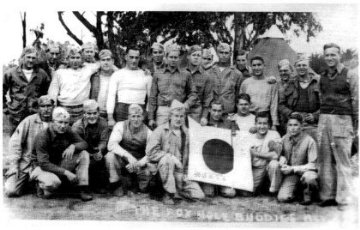 Rube (behind flag with hand on sword) and fellow Marines
pose with trophies.
Rube (behind flag with hand on sword) and fellow Marines
pose with trophies.
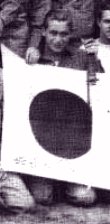
*The sword (shown left)
which was taken at the Grassy Knoll on Bloody Ridge
now resides in the United States Marine Corp Museum in Washington,
D.C.
October 2, 1942
Two air raids at night. At 9 pm, three bombs. At 4:30 am, four bombs.
Expecting mail today as more ships have arrived.
October 3, 1942
Two bombings at night. Seven bombs each time. A raid at dawn but they
were intercepted. We lost four to their two. Major Smith was shot down.
He said they'd all pay. Another raid and he got four planes. We got five
altogether. Seven bombers, three Zeros strafed field. Sgt. Kruse at HQ
got one with 50 cal.
"Old Kruse was a Marine private when I first met him with 12 or 15
years service. He'd been kicked out of the Marine Corps on a bad conduct
discharge, and re-instated back into the service. Anyway, Frank had a whole
bunch of hash marks and one Pfc. stripe (laughs).
One time we had a tent there that was supposed to be full of Japanese
beer or Saki. I took a truck one day with two or three of my people...and
I went down there and there was a Marine sentry walking around with a rifle
in his hands and he said "Wait til I get on the other side, then duck under
and get some". So he went on around and we zipped under this tent and grabbed
three or four or five cases of whatever and away we went. And we get out
there somewhere and we run across Frank Kruse.
So old Frank says "Garrett, what you got... what you got over there..."
and I say "Hey Frank, we got a bunch of Japanese beer." He had some Japanese
liquor or Saki or something - we didn't know what we had. And he said "Hey,
I'll give you a bottle of this for a case of that..." I said "Hell no Frank,
you think I'm crazy?" Anyway we went on to the battery and you know these
bottles were all written in Japanese; they were brown bottles, looked like
beer bottles. Turned out to be vinegar. I wonder if its possible it might
have been wine that went bad? I have never thought of that...but I sure
wished I had taken Frank Kruse up on his offer (laughs)."
|
October 4, 1942
Bombs again. Fired back with 20 mm. but missed. Had an alert as invasion
was expected. Cofer returned from hospital to battery.
October 5, 1942
All quiet again but one of our planes dropped a bomb on the beach and
it scared hell out of us.
October 6, 1942
Peaceful again for a change. No bombers. Foxworth and myself went to
rear and found two clips of 25 cal. ammo. Went down to aviation unit and
got news that the Cards won series.
October 7, 1942
Went with Al Schlemmer on patrol. G Co., 1st. Regiment. Found two Jap
75 mm. cannons which we disabled. Came back alone with two guys. Found
dead Jap and got ammo carriers. The Jap was executed by his own men - his
head was cut off.
October 8, 1942
Quiet around battery, but hear guns firing from the front. They say
there is 8,000 Japs there. Dive bombers and strafing all the time. Big
Battle.
*On this day, the U.S. Marines launched a new offensive to extend the
defense perimeter around Henderson Field. Within a few days, advance battle
positions were established along the banks of the Matanikou River.
October 9, 1942
The 'Joe Duck' was over at night and dropped one bomb. Fired back with
20 mm. and 50 cal. No damage. A bomb fell at our position but no one was
hit.
"I'm not sure why I wrote 'Joe Duck'. He eventually became known
as 'Washing Machine Charley', as we called him, for the sound his motor
made in the night."
October 10, 1942
Had working party at beach quartermaster. No raids. One in my platoon
cracked up and I took him to Dr. Queen.
"A Private had a nervous breakdown in the foxhole with me - he was
crying and very shaky and all, so he reported to the hospital. He stayed
at the hospital one or two days, came back and he was okay the rest of
the campaign."
October 11, 1942
Rained all morning. Church services. Air raid also - 60 bombers came
over. We got 16 . No bombs dropped because of heavy clouds.
October 12, 1942
Quiet at night but three raids at night. The Army came in or is supposed
to.
October 13, 1942
Little firing at night. Army came - 2,500 of them. Also two raids. A
wave of 21 at 11pm - 14 at 1 or 2 am. Two direct hits on runway. Schlemmer
came over.
October 14, 1942
Quiet again but had three air raids. 21 first wave; eight second; six
third. Didn't do much damage.
October 15, 1942
First shelling since cruiser on September 13. This time was worse as
shells were falling everywhere. Few casualties. Three waves of bombers
- 25 in the first, nine in the second, eight in the third.
* For several days, Japanese naval and air units unleashed heavy attacks
on Guadalcanal. The battleships Kongo
and Haruna
bombarded U.S. positions on the island for 90 minutes with 14
inch guns and inflicted great damage. Henderson Field was knocked out
temporarily. Only 42 aircraft were left operational and aviation fuel was
down to critical levels. It is estimated the Japanese battleships fired
973 rounds. This was the worse shelling the Marines endured during World
War II.
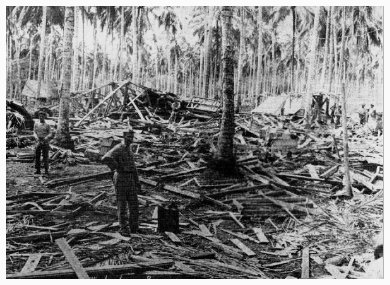 Communications building destroyed during shelling of Henderson
Field
Communications building destroyed during shelling of Henderson
Field
"All of the Cactus Air Force guys slept in the woods right behind
our position. And during shellings and things you know we had large bunkers;
eight or nine men could lay down in side by side and it was covered over
by logs and sand bags and things like that. Of course, I don't think they
would of held up to a direct hit or anything. Those pilots would come out
and would get in our fox holes with us during naval shellings and night
bombing raids. And there's something about combat that's mysterious in
the sense that...you can be laying in a fox hole and go into uncontrollable
shaking or shivering and its contagious. It'll just go right down the line.
And if, say you're the one that started it - or I'm the one that started
it - you'll hear somebody say "Garrett you bastard" (laughs)...and I'm
shaking like hell and everybody else is shaking like hell too...its a quivering
sort of state; I guess its nervous tension."
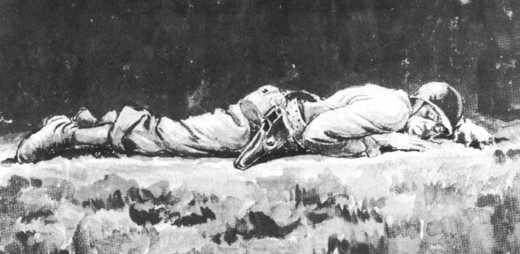 |
Captain Donald L. Dickson, USMCR
---------------------------
Capt Donald L. Dickson said of his watercolor: "I wanted to catch on
paper the feeling one had as a shell comes whistling over. ... There is
a sense of being alone, naked and unprotected. And time seems endless until
the shell strikes somewhere." |
October 16, 1942
Short shelling in night. Japs are landing on beach 20 miles distance.
Six transports and four destroyers. One of our PBY's kept us awake most
of night but got a Jap ship. 22 bombers came over at 12:40am. An alert
at four. They say our fleet is out there. 'Maytag Charlie' came over three
times with one, two, and seven bombs. Shelling that lasted 1 1/2 hours.
Seven dive bombers came in morning. Raining too.
* Japanese reinforcements (about 4,000 men) landed at Tassafaronga point
on Guadalcanal. U.S. supplies also reached the island, mostly aboard transport
planes.
"We were shelled by cruisers beginning at midnight because they had
to stay out of range of our planes. About dark they would head full speed
ahead in our direction to shell, then later would cut off about 3am to
give them time to get out of range before daylight. Therefore we saw a
lot of activity between midnight and 3am, in regards to shelling. We had
a daytime shelling from naval ships - they might have been, I guess, destroyers.
We could see the shells and the Japs shelling our forces. Of course, we
were inshore and we thought it was our forces shelling the Japs. But we
could see the shells tumbling end over end, which is something you wouldn't
hardly believe unless you'd seen it...but its true because I saw it."
|
October 17, 1942
Col. Bauer went up to
meet Maytag. He didn't come. No shelling. Dogfights first thing this morning.
Two zeros by AA, six by fighters. 19 altogether, four bombers. 105's got
Jap Artillery. 18 bombers at noon - we got all of them, 37 in all.
"You know we had radios from out of wrecked fighter planes...we hooked
them up to truck batteries. We would listen to dogfights on the radio,
"watch that son of a bitch, he's coming your way! He's coming your way...'bloom
bloom bloom', Talley Ho!" That was their victory cry. I think that might
have been common in all the forces - it came from the old fox hunt."
October 18, 1942
Short shelling but our Navy was around. No Maytag. At noon, 16 bombers
came. I saw five go down. We got 10 bombers, 11 Zeros.
October 19, 1942
All quiet again. No air raids. Working party for Regiment digging holes.
They moved as shells and bombs from dive bombers were habitually falling
too close to the field.
October 20, 1942
Expected shelling. None came off, thank God! Air raid of 16 bombers.
11 flew over. They got them farther out. Also, some Zeros.
October 21, 1942
Seven Bombers come over but they didn't drop any bombs. Most noise in
dogfights but could not see anything - too cloudy. Planes at sundown. Just
missed us. Got one with AA. Two more waves after. Lights were on them.
October 22, 1942
Again night raids but was so cloudy our spotlights were no good. Lt.
Col. Bauer was ready to go up but they were never located. Only a few dive
bombers got in. Took our gun to Pagoda Hill with 140 rounds to shoot back.
They were falling close. Rained too.
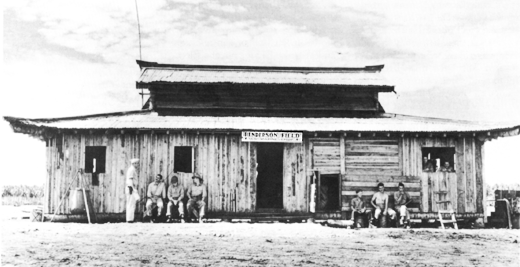
The only building on Henderson Field when the Marines
landed on Guadalcanal, the Pagoda was the scene of Cactus Air Force briefings
October 23, 1942
First calm in long time. Air raid - 15 planes. We got 20 Zeros and bombers.
Took 130 rounds from G Battery and fired 286 rounds. The Japs started drive.
October 24, 1942
No air raid but under Jap artillery fire. Took 236 rounds to hill. Close
call. We did it in rain - Smith, Kidd, Moretti, Tench, Newhouse and myself.
October 25, 1942
Battle started at 12:30. Lots of noise from planes all morning. Watched
nine go down - three parachutes. More coming. At 1pm, five dive bombers
dived our wrecked planes. We lost two, got 21.
*Japanese forces attempted to cross the Matanikou River. This day marked
the beginning of the Battle of the Matanikou.
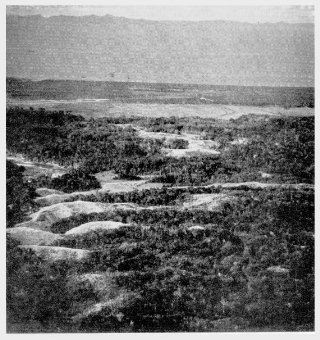 This arial view shows the series of ridges fought over and
defended by Col. 'Chesty' Puller's 7th Marines in October and the Battle
of the Matanikou. The dough-nut shaped ridge to the rear is Bloody Ridge,
the site of Col. 'Red Mike' Edson's defense of the previous month, with
Henderson Field in the distance.
This arial view shows the series of ridges fought over and
defended by Col. 'Chesty' Puller's 7th Marines in October and the Battle
of the Matanikou. The dough-nut shaped ridge to the rear is Bloody Ridge,
the site of Col. 'Red Mike' Edson's defense of the previous month, with
Henderson Field in the distance.
During the first night Sgt. John Basilone defended his central position
with a small handful of Marines. After charging down a jungle trail, holding
his machine gun by its tripod and killing six of the enemy, he set up his
weapon on a slight ridge then repaired two other machine guns which had
been disabled by the Japanese. Rolling from gun to gun, Basilone kept up
a murderous fire in the face of repeated assaults by a determined foe.
As the enemy worked their way around to his rear, he would pause and shoot
behind his position with his pistol. By morning, having fired off 26,000
rounds, his guns were burnt out. "
Manilla John" Basilone received the Medal
of Honor for his action. Although sent state-side, he requested and
received permission to rejoin his unit. He was killed by a mortar burst
shortly after landing on Iwo Jima.
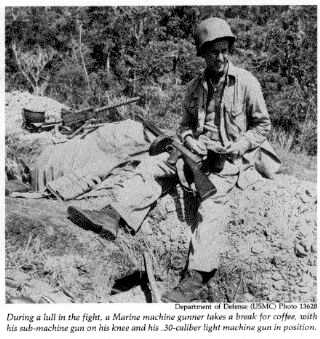
On the second day of the battle, Sgt.
Mitchell Paige won the Congressional Medal of Honor. Hurling genades
then cradling a 30 cal. water cooled machine gun in his arms, Paige lead
a charge on Japanese positions in the jungle at the foot of the ridge.
After sitting down, he noticed his forearms were blistered from wrist to
elbow.
 Five Japanese tanks sit dead in the water near the mouth
of the Matanikou River, destroyed by Marine
37mm gunfire
Five Japanese tanks sit dead in the water near the mouth
of the Matanikou River, destroyed by Marine
37mm gunfire
|
|
Col. 'Chesty' Puller had organized interlocking fields of fire along the ridges and reinforced his flanks with heavy machine guns and anti-tank artillery. That night, as wave after wave of attacking Japanese rolled in through driving rain, Puller called 11th Artillery Commander Col. Pedro del Valle. "Give us all you've got. We're holding on by our toenails." "I'll give you all you call for, Puller", del Valle replied," but God knows what'll happen when the ammo we have is gone". "If we don't need it now, we'll never need it. If they get through here tonight there won't be a tomorrow", Puller thundered. "She's yours as long as she lasts", responded del Valle. 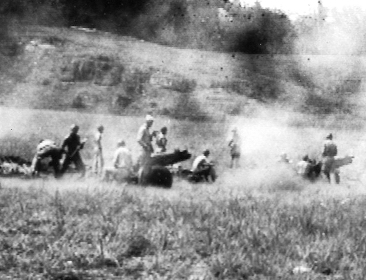 After a couple o
f hours, our Howitzers were white hot at the muzzles After a couple o
f hours, our Howitzers were white hot at the muzzles
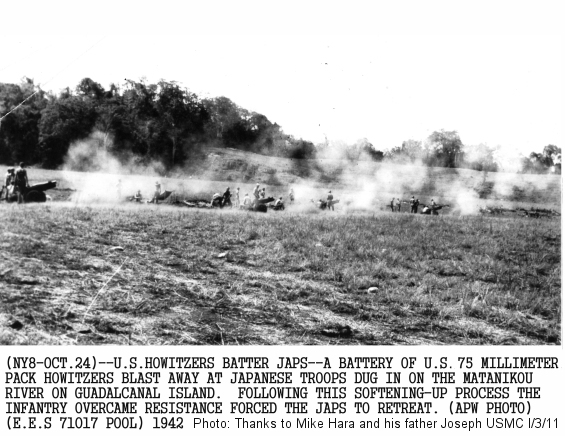
"To neglect mention of what our artillery did these two nights would be to overlook what might have been, as it so often was at Guadalcanal, the deciding tactical factor. The huge Howitzers (we now had 155s) roared all night, as the men of the 11th spit on their hands and pulled their lanyards." - The Old Breed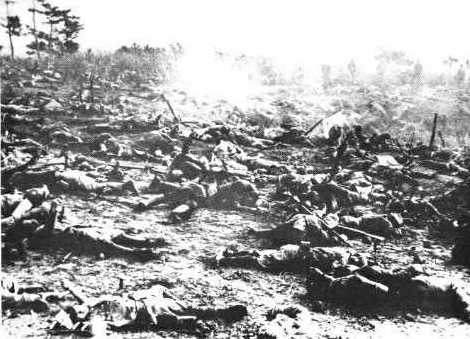 This was the scene on the slopes the morning following the final Japanese assaults of the Battle of the Matanikou This was the scene on the slopes the morning following the final Japanese assaults of the Battle of the MatanikouIn the face of an intense artillery barrage (the heaviest in the fighting), the Japanese scored some initial success but lost an estimated 3,500 men over the two days of fighting. The Marines suffered 300 dead.
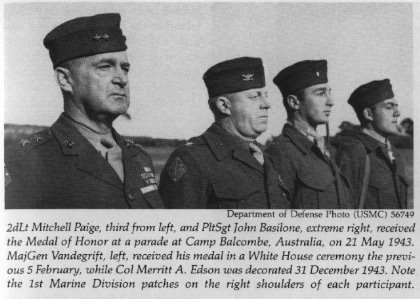

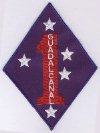
Guadalcanal Patch ...

|
October 26, 1942
No air raids but firing from front all day. Some snipers to the rear
of battery. No one was hit though.
October 27, 1942
Firing all night. Went back and looked over dead Japs. Picked up a Jap
rifle. An air alarm but no enemy planes showed up. One flew over at night.
"I went back to the battlefield and viewed the dead Japanese. I watched
the burial detail. We had some Japanese soldiers...in this case though
I think they may have been Korean laborers, I'm not sure, but they were
piling the bodies into a hole which we would put lime over then cover with
bull dozers. I also picked up a rifle as a souvenir but I lost it in the
war.
October 28, 1942
Little firing from front but no air raids. Plenty of rain though.
October 29, 1942
All quiet on southern front. Slow drizzling rain all day. Another false
alarm. Made water run and picked up Jap washing machine.
"One day, soon after the drive on the Matanikou, we go back to the
battery - me and several troops from my section - went back to pick up
whatever ammunition was left behind. I said "Harry, lets make one last
bucket of coffee". So we lit a fire, and put the proper amount of water
in there and the coffee was going good...it was like four o'clock in the
afternoon, somewhere in that neighborhood...and we heard a creaking noise.
It was a noise I didn't identify, and in combat one of the scariest things
a man can do is holler "uh oh". Sombody says "uh oh", and you're saying
"what is it, what is it, what is it!" And I'm listening to that weird noise
and somebody says "uh oh" and takes off just running and those hard steel
heels are just hitting that deck "bloom, bloom, bloom" and we were on the
edge of a clear field - we were back in the trees next to the airstrip
- so we all just follow...we all run like crazy, run out into the opening
and here comes a tree just tumbling down - blom! Right on our tent! The
tree had been cut through enough with naval shelling - shrapnel - that
it was ready to fall, and when the wind hit it right, it just come right
on over. When we heard one of our group running...they just stampeded,
and I went with them. But some of us didn't know why we were running and
I'm not sure the guy who was running did either. But that was frightening
- that puts your heart up in your throat. You know, when somebody's out
there shooting, that's a different kind of fear...this was sudden fright."
|
October 30, 1942
Quiet from front but Jap planes overhead dropped two flares. Battery
to move up to Matanikou for offensive. Traded pistol for Jap watch and
rifle.
October 31, 1942
Started drive and at dark was four hours ahead of schedule. Sgt Kruse
was hit and killed by 'One Lung'. Plenty hot, plus Jap artillery. Reached
position after dark and then had to bring up ammo.
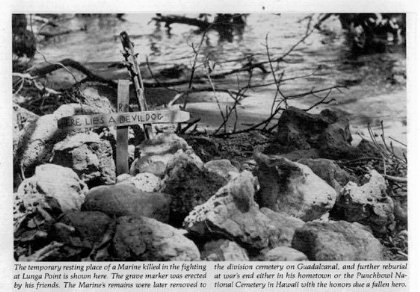 'Here Lies a Devil Dog'
'Here Lies a Devil Dog'
" Sgt. Kruse was killed on the same grassy hill from which he had
single handedly shot down an attacking Jap Zero with a 50 cal. machine
gun on October 3rd, just three weeks before. 'One Lung' or 'Washing Machine
Charley' came in and dropped a bomb on him. I heard 'Charley' was finally
shot down at Rabaul by ground fire. They were shooting at our planes just
as 'Charley' was coming in - he got caught in the spotlights and was shot
down by his own guys."
*This was the beginning of the push on Kokumbona. Japanese were trapped
on the beaches as Marines crossed the Matanikou driving west.
(Photo Missing)
"The surrounded Japanese, with their backs to the ocean, were mopped
up in three successive bayonet assaults." - The Old Breed
|
Previous * * * Index
* * * Next














